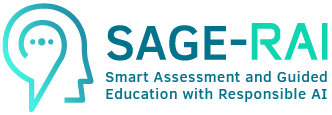About the Workshop
The event aims to explore the transformative potential of artificial intelligence in education (AIEd). Inspired by Bloom's groundbreaking 1984 paper, which demonstrated the significant benefits of personalized one-to-one teaching, our event focuses on harnessing AI to overcome socioeconomic barriers and provide personalised education on a massive scale [1, 2]. This initiative aligns with the ethos of equality, aiming to enhance learning outcomes and broaden access to diverse learners.
The event will feature an in-person workshop with a carefully crafted structure to facilitate engagement and knowledge sharing. Commencing at 10 am and concluding at 4 pm, the workshop will comprise two keynote sessions, each lasting 45 minutes. These sessions will delve into the state of the art in AIEd, offering insights and inspiration to the audience.
The schedule also includes two discussion segments, providing a platform for semi-structured conversations on the application of AI in assessment, teaching delivery, and educational content production. These discussions aim to foster dialogue among AI researchers, developers, educational practitioners, and policy makers, encouraging the exploration of emerging concerns and opportunities in the field.
To promote networking and the exchange of best practices, the workshop will incorporate a poster session, where participants can showcase their work and engage with peers. A 30-minute coffee break and a one-hour lunch break will provide additional opportunities for networking and informal discussions.
The event targets a diverse audience of 50 to 100 individuals, drawing participants from various disciplines, including AI researchers, developers, and educational researchers, as well as practitioners and policymakers. This inclusive approach ensures a multifaceted exploration of AIEd, fostering collaboration and knowledge exchange.
With a comprehensive structure that combines keynotes, discussions, and interactive sessions, the AI UK 2024 Fringe event aspires to contribute significantly to the discourse on AI in education.
[1] EducationWeek - What Do Teachers Think of ChatGPT? You Might Be Surprised.
Register
Registration Closed
Workshop Date
22nd March 2024
09:50 - 16:00
Venue
Royal Geographical Society
(with IBG)
1 Kensington Gore,
London, SW7 2AR
Registration Closed
Agenda
Workshop Programme
| Time | Title | Presenter |
|---|---|---|
| 9:50 - 10:00 | Welcome and Introduction | |
| 10:00 - 10:45 | Keynote 1: Empowering Students and Teachers for a Future Transformed by AI |
Abstract: This talk explores the critical role of education in preparing students for a future increasingly shaped by AI. I will discuss three key aspects of AI in education: using AI tools to tackle educational challenges, changing education to focus on human intelligence and prepare people for an AI world, and educating people about AI to ensure its safe and effective use. Generative AI necessitates a fundamental shift in educational assessment, focusing on self-awareness, self-regulation, metacognition, and other essential thinking capabilities to future-proof careers. AI is both a catalyst for change and a potential solution to the challenges it poses in education. To empower students for the future, education must emphasize the importance of developing sophisticated thinking skills that are uniquely human and not automatable through AI. Rose Luckin (UCL, Knowledge Lab) |
| 10:45 - 11:15 | Discussion | |
| 11:15 - 11:45 | Coffee Break | |
| 11:45 - 12:30 | Keynote 2: AI changes Everything! |
Abstract: AI may turn out to be the most important technology our species has ever invented. It will change the nature of work, research, why we learn, what we learn and how we learn. Donald will focus on the research so far of the impact of GenAI on learning, as well as the many areas in which it is being applied, along with a vision for an AI-led University. Donald Clark (CEO, WildFire Learning) |
| 12:30 - 13:00 | Minute Madness | |
| 13:00 - 14:15 | Lunch with Posters | |
| 14:15 - 15:00 | Keynote 3 AI: from Coach to Copilot |
Abstract: As AI becomes ever more woven into society, the Education sector has a critical role. Those working in Industry span a continuum - from individuals just starting their AI journey to the world's pre-eminent Scientists. Many are just starting to understand the full extent of what's possible. During this session, Microsoft team will share thoughts and insights on the use of AI across the sector, whilst also drawing upon the lessons learnt from other industries. Security, governance, skills, and responsible / ethical AI are amongst the key pillars of building trustworthy and reliable AI outcomes. The session will discuss how data and models can be protected from unauthorised access, tampering or theft. How governance ensures processes and policies for developing and deploying AI are transparent, accountable, and fair. The importance of skills, both in consideration of your curriculum and your own workforce. And lastly, the approach of Responsible / Ethical AI to ensure alignment with human values and social norms. By following these principles, we can create AI solutions that benefit society and empower individuals. Cris Bloomfield (Senior Industry Architect, Microsoft) |
| 15:00 - 15:30 | Discussion | |
| 15:30 - 16:00 | Closing Remarks | |
We're excited to announce a Minute Madness and Poster Session as part of the afternoon program. During the Minute Madness, each participant will have one minute to present a teaser slide from their poster.
The topic of the slide and poster should be about your work, ideas or reflections in the context of AI and education
Kindly send your slide via the button below by March 20th and remember to bring your poster with you to the event!
Keynotes

Rose Luckin
Professor of Learner Centred Design
UCL Knowledge Lab
Rosemary (Rose) Luckin is a Professor at University College London and Founder of Educate Ventures Research (EVR) who has spent over 30 years developing and studying AI for Education. She is renowned for her research into the design and evaluation of educational technology and AI. She was named as one of the 20 most influential people in education in the Seldon List in 2017, the only non-US winner of the ISTE Impact Award, and one of Computer Weekly's top 50 most influential women in technology for 2023. Rose regularly provides expert evidence to policymakers like the UK Parliament's House of Lords and House of Commons select committees and the European Commission.
Rose has published widely in academic journals, at international conferences, through books, and in news media (TV, radio, newspapers, and magazines). Her 2018 book, Machine Learning and Human Intelligence: The Future of Education for the 21st Century, has been translated into Mandarin and influenced many of China's leading AI companies. Her most recent book, AI for School Teachers (2022), is an essential and accessible guide to AI for anyone in education.
Rose also founded EDUCATE Ventures Research Ltd., a London hub for educational technology startups, researchers, and educators engaged in evidence-based edtech and leveraging data and AI to benefit education.
Rose has taught in secondary, further, and higher education. She has led many large interdisciplinary international research projects and held senior leadership roles in higher education, including as Pro Vice Chancellor for Teaching and Learning at the University of Sussex before joining UCL in 2006. She is President of the Self-Managed Learning College in Brighton and host of the EdTech podcast.

Donald Clark
CEO
WildFire Learning
Donald is an entrepreneur, CEO, Professor, speaker and blogger. He was CEO and one of the original founders of Epic Group plc, which established itself as the leading company in the UK e-learning market, floated on the Stock Market in 1996 and sold in 2005. Describing himself as 'free from the tyranny of employment', he now the CEO of an AI learning company WildFire, investor and Board member of PlanB learning, LearningPool and Cogbooks. He has been involved in consulting and implementing online learning in schools, FE, HE, corporate and government.
Donald has been involved in film, games, web, mobile, MOOCs, Oculus Rift and won many awards for the design and implementation of online learning. He is a regular speaker at national and international conferences, having delivered talks in the US, Europe, Far East, Middle East and Africa, and won several 'Best speaker' awards … also a regular (and controversial) blogger on online learning!
Find out more on LinkedIn

Cris Bloomfield
Senior Industry Architect
Microsoft
Dr Cris Bloomfield is a Senior Industry Architect within Microsoft who works with Higher Education institutions across Europe, Middle East and Africa. With past roles in the financial services and retail industries, he is also former academic researcher and lecturer who went on to leadership roles in IT Services at a number of Russell Group universities. He has over 25 years of broad experience working in Education and has led large scale infrastructure modernization, digital innovation initiatives and new build projects across a wide range of technologies. Cris is currently supporting a number of current digital transformation initiatives that are looking to leverage generative AI capabilities in both teaching and learning and professional services contexts.
Find out more on LinkedIn or follow him on @CrisBloomfield.
Organisers

John Domingue
Professor of Computer Science
Knowledge Media Institute
The Open University
John Domingue holds a position of Professor of Computer Science, at the Knowledge Media Institute (KMi) and serves as the President of STI International, an organization specializing in semantics and responsible for the ESWC conference series. With a prolific career including serving as KMi Director from 2015 to 2022, Prof. Domingue has contributed over 240 refereed articles in fields such as semantics, AI, the Web, distributed ledgers, and eLearning. From 2017 to 2021, he led the first of five themes on University Learners for the £40M Institute of Coding, an initiative aimed at increasing the number and diversity of computing graduates in the UK while strengthening the connection between university teaching and corporate training. Between 2022 and 2023, Prof. Domingue spearheaded a project to develop a smart national educational content platform that incorporated cutting-edge AI techniques to support further education educators. Since 2023, he has been at the forefront of examining the impact of Generative AI on higher education. Prof. Domingue has delivered numerous talks on his work, including appearances at the Royal Institution in 2018, TEDx, and featured in THE Campus on interdisciplinary research teams. In 2019, he was inducted as a Fellow of the British Blockchain Association, and in 2020, he became an Honorary Professor at Amity University.
To learn more about his work, visit:
kmi.open.ac.uk/people/domingue or follow him on @johndmk.

Miriam Fernandez
Professor of Responsible AI
Knowledge Media Institute
The Open University
Miriam Fernandez is a Professor of Responsible Artificial Intelligence at the Knowledge Media Institute (KMi), Open University (OU), UK. Her research agenda revolves around advancing Responsible AI, ensuring that technological innovation aligns with ethical principles and societal values. Her pioneering work spans diverse domains, from algorithmic transparency and fairness to the societal implications of AI deployment. By integrating cutting-edge AI techniques with a human-centred approach, she fosters solutions that prioritise social responsibility, transparency, and inclusivity. With a portfolio of more than 100 scientific articles in some of the best conferences and journals in her field, and having won numerous external grants supporting her research with over £2M, Professor Fernandez has significantly influenced the discourse in the field of technology development and its impact on society. Her commitment to education is demonstrated through her leadership of OUAnalyse, a strategic initiative leveraging machine-learning methods for the early identification of students at risk. This technology, currently supporting the Open University's 200K student body, has been highly awarded for its transformative impact on student outcomes. Additionally, she serves on the organising committee behind HESPA's (The Higher Education Strategic Planners Association) Learning Analytics Interest group, facilitating knowledge sharing and best practices among organisations across the UK. Professor Fernandez is also Equality and Diversity Champion for both KMi and the OU.

Christothea Herodotou
Professor of Learning Technologies and Social Justice
Institute of Educational Technology
The Open University
Christothea Herodotou is a Professor of Learning Technologies and Social Justice, at the Institute of Educational Technology of the Open University. She is also Associate Director of Quality Enhancement and Innovation, piloting ways Artificial Intelligence can be used to support students at risk of failing as well as processes of course production. She has extensive expertise in the design and evaluation of learning technologies that promote education opportunity and social justice, including predictive learning analytics dashboards, online citizen science websites, and mobile game applications. She is the academic co-lead of the Early Alert Indicators project, a university-wide initiative that uses predictive learning analytics to identify and support students who are struggling with their studies through early teacher interventions. She has attracted funding from major funding bodies including the National Science Foundation in the US, Horizon Europe, and UKRI. She has authored more than 100+ outputs the great majority of which in peer-reviewed outlets and as a first author. She is a Senior Fellow of the Higher Education Academy (SFHEA) and an elected member of the International Society for Artificial Intelligence in Education (IAIED). She received her Ph.D. degree in Digital Games and Psychology from the University College London (UCL) and her MSc in Education, Technology, and Society from the University of Bristol (with Distinction).
More info here: https://iet.open.ac.uk/people/christothea.herodotou#biography

Mychelle Pride
Academic Director PVC-Students
Faculty of Wellbeing, Education & Language Studies
The Open University
Mychelle Pride is more than just an academic leader at the Open University - she's a passionate advocate for empowering students to reach their full potential. With over two decades of experience in higher education, her focus has been unwavering: to break down barriers and create an inclusive learning environment where every student thrives.
As Academic Lead for Access, Participation and Success, Mychelle spearheads initiatives that level the playing field. Whether it's championing mental health awareness or leading the charge in Generative AI for education, she's constantly innovating to make the learning journey smoother and more enriching for all.

Mike Richards
Senior Lecturer
School of Computing & Communications
The Open University
Imagine a pioneer helping students navigate the wild west of the internet in its early days. That's Mike Richards, a seasoned lecturer at the Open University, whose journey began in 1996 – teaching the very first modules delivered online! Since then, he's donned many hats: explaining the intricacies of robots, unraveling the genius of Leonardo da Vinci, and, most notably, becoming a cybersecurity guru, guiding students through the complexities of everything from Enigma machines to the secure world of e-shopping.
But Mike's not just a tech whiz; he's a passionate educator. He's crafted award-winning courses like "Technology in Use" (TU100), touching the lives of thousands. His work doesn't stop there – he's also honed his editorial skills, shaping computer forensics modules and ensuring every student has a clear path through the digital labyrinth.

Elena Simperl
Director of Research ODI & Professor of Computer Science and Deputy Head of Department for Enterprise and Engagement in Informatics
Kings College London
Elena Simperl is a Professor of Computer Science and Deputy Head of Department for Enterprise and Engagement in Informatics. In March 2023 she was appointed Director of Research for the Open Data Institute (ODI) where she will lead on the Institute's research strategy. She is also a Fellow of the British Computer Society and features in the top 100 most influential scholars in knowledge engineering of the last decade.
Professor Elena Simperl obtained her doctoral degree in Computer Science from the Free University of Berlin, and her diploma in Computer Science from the Technical University of Munich. Prior to joining King's in 2020, she was a former Turing Fellow, and held positions in Germany, Austria and at the University of Southampton.
Her research is at an intersection between AI and social computing, helping designers understand how to build smart sociotechnical systems that combine data and algorithms with human and social capabilities. Professor Simperl has been involved in forty European and national research projects, including more recently QROWD, ODINE, Data Pitch, Data Stories, and ACTION.
She is currently the scientific and technical director of MediaFutures, a Horizon 2020 programme that is using arts-inspired methods to design participatory AI systems that tackle misinformation and disinformation online.
Elena's interest in leading initiatives within the scientific community has also taken form through chairing several conferences in her field, including the European and International Semantic Web Conference series, the European Data Forum, and the European Semantic Technologies conference. She is the president of the Semantic Web Science Association.
Sponsor

